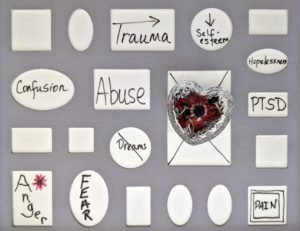Trauma Bonding: 5 Signs & What To Do
Naturally, you may think that if someone is abusive, the abused person will stay as far away as possible. In reality, some people cannot cut that attachment to people who hurt them. Even if that person knows the other person is no good for them, they still stay.
Trauma bonding is when you still have warm feelings or miss your abuser because of your connection with them. This can be an abusive parent, romantic partner, kidnapper, cult leader, and other roles like this. You depend so much on this person to tell you what your worth is. After your partner hurts you, they may apologize and tell you it will not happen again to ensure you are still in their corner. Your hope that they will change is what makes you stay.
Here are five signs of trauma bonding and what you can do about it.
 1. Ignoring Red Flags
1. Ignoring Red Flags
When you first bond with your partner, everything seems great. You are in the sunshine-and-rainbows phase when happy, feel-good chemicals are released, increasing the attachment you have with that person. In a trauma bond, you are actually addicted to these feelings and will only see what you want to see.
Closing contact with your abuser will help you focus on yourself. You have probably forgotten all about who you are because you depend on your abuser to tell you. Do not waste your energy on someone who puts you down.
 2. Avoid Confrontation
2. Avoid Confrontation
Being in a trauma bond can mean not wanting to have open communication with your abuser. You want your abuser to be perfect with no darkness in them. In order to avoid a fight, you would prefer to just hope for changed behavior. It is possible you may rationalize this behavior as your fault and try harder to avoid conflict.
Repressing your emotions and pretending nothing happened will not fix anything, but allow the abuse to continue. It is always important to share openly in order to have a real relationship with someone. Otherwise, this person is not healthy for you if you have to hold everything inside.
 3. Feel the Need to Walk on Eggshells
3. Feel the Need to Walk on Eggshells
When someone is controlling, you feel like you cannot be yourself. You feel the need to be what the other person wants you to be. If this behavior continues, you will start to believe this is what love is and find your abuser’s behavior okay.
You can write in a journal about what you are really feeling towards your abuser’s behavior. Write down what you wish you could say. Read back on what you have written and realize what you have down on paper is who you really are. Since you feel like you are walking on eggshells around your abuser, it is helpful to have tangible notes of how you think outside their shadow.
 4. Defending Toxic Behavior
4. Defending Toxic Behavior
If your abuser puts you down, you may tell yourself or others that you deserve it. You could also say this person is just stressed from work or does not mean what they say. A healthy relationship means both people are accountable for their own actions. The blame is not always on one person. Write down what you know are your best attributes. If your abuser continues to put you down, look at this list and realize how wrong this person is.
5. Loyalty Even in Danger
Loyalty in your abuser is about seeing only the good and forgetting the bad. No matter how threatened you feel, you cannot picture your life without this person. A trauma bond can lead to heightened anxiety when you spend your days on edge.
If you are still struggling with trauma bonding, here at JoyFeel Therapy, we are here to listen and support you. Contact us today!

